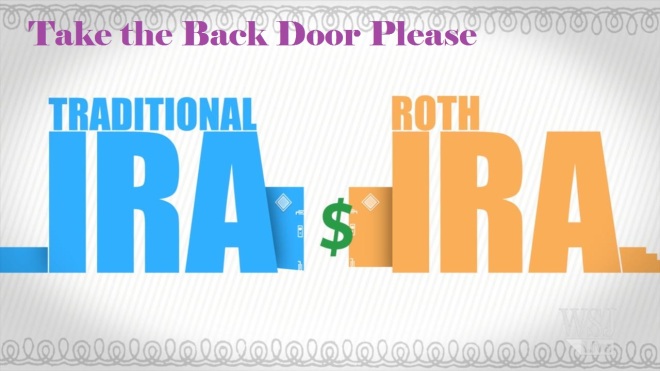I’ve been making steady contribution to a Roth IRA account for quite a few years, however, since the edition of my rental business, it drives up my income surpassing the Federal limit for contribute to my Roth IRA account.
Roth IRA phase-Outs. In 2018, the AGI phase-out range for taxpayers making contributions to a Roth IRA is $183,000 to $193,000 for married couples filing jointly, up from $181,000 to $191,000 in 2017. For singles and heads of household, the income phase-out range is $116,000 to $131,000, up from $114,000 to $129,000.
At the first glance, I thought I should just give up contribution until I quit working full time, at that point my income would surely allows me to slowly convert my 401K to Roth IRA at 0 or 15% tax. However, a smart blogger, Investment Hunting told me I should do a conversion. I thought about it, but I’ve been busy planning my 5 summer vacations, the market took a beating, I was busy buying. Now that the market has recovered. I decided to sell some stocks to in my taxable account, then put it in my IRA account, then convert it to my Roth IRA account. This is the first time I’m attempting at this, so the process may takes awhile.
I pulled up my brokerage website, they have these steps:
- Open an IRA account (I’ve already had one)
- Open a Roth IRA account (I’ve already had one)
- Call the 1800 number for them to email or mail the form, fill it out, fax it back
- Wait for the paper work to take place and the fund to become available
I don’t want to make any divestment, as selling securities is not my goal at this point, growing dividend is my goal, position that I use for this exchange is V, D, and GE. I’ll simply buy them back once the fund become available.
Have anyone of you done this before? What was your process like? How did you file the taxes?

Disclaimer – this is not legal or tax advice.
I would urge you to talk to whoever prepares your taxes.
I have personally rolled a 401k to a Traditional which I then converted to a Roth, because long term it made the most sense. My 401k options were horrible and doing the math If I live x number of years I will come out ahead paying the taxes now.
If you convert.. you’ll have to pay taxes on contributions and gains.
Similar to how people decide at tax time if they should contribute more to a traditional to lower their yearly income, I’ve had clients that convert from traditional to Roth in increments, they convert just enough to not bump them up into the next tax bracket.
You will want to talk to your tax person before making any moves.
There are some great advantages to a roth once you’ve got the tax consequences taken care of.
I eventually want to do that myself, but in a different way. I unfortunately don’t have the same problem you do (making too much money to contribute to a Roth IRA), but I do have a 401k at my job. When I finally make the jump to early retirement, my plan is to then roll that money into a traditional IRA and then slowly move that money into a Roth IRA, paying the taxes as I go (which is why I would do bits each year rather than the whole thing). After five years, I could start withdrawing whatever principal is in there.
It’s clumsy and takes awhile, but it’s a way to access your money before 59 and 1/2. Fortunately, my primary retirement strategy is living off my dividend income rather than relying on IRA principal, so this would be nothing more that a supplement for me.
A very small supplement.
Sincerely,
ARB–Angry Retail Banker